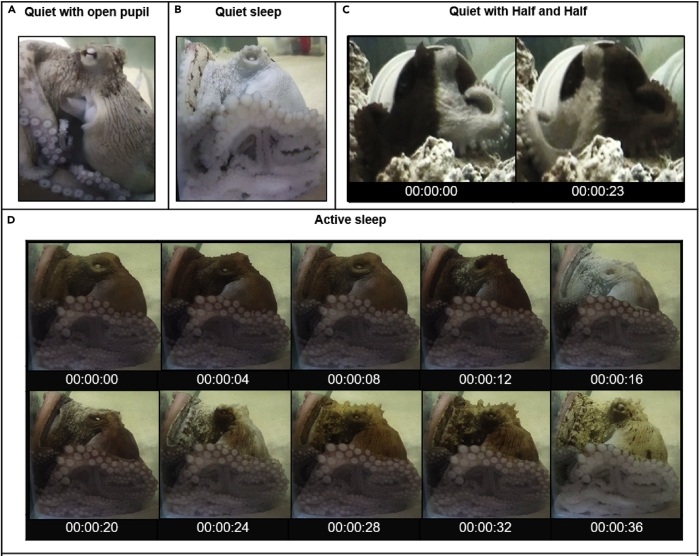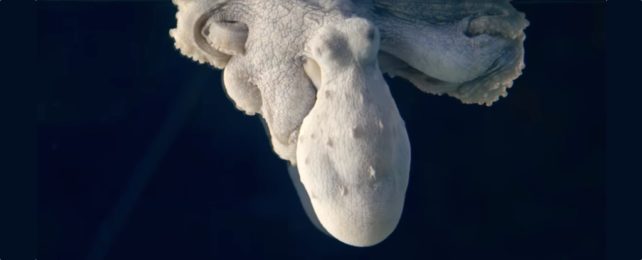The flickering colors of a sleeping octopus seem to indicate something akin to an REM sleep state, scientists have found.
In fact, as octopuses snooze, they distinctly cycle between two major sleep states, quiet and active. This discovery suggests not only that an active sleep state evolved separately in vertebrates and cephalopods, but also that, just like terrestrial vertebrates, octopuses might be able to dream.
"The alternation of sleep states observed in the Octopus insularis seems quite similar to ours, despite the enormous evolutionary distance between cephalopods and vertebrates, with an early divergence of lineages around 500 million years ago," said neuroscientist Sylvia Medeiros of the Federal University of Rio Grande do Norte in Brazil.
There's a lot we don't know about sleep. For a long time, scientists thought that only birds and mammals had sleep cycles, moving between active and quiet states - called REM (rapid eye movement) and non-REM sleep. REM sleep was only documented in reptiles for the first time five years ago.
Yet there had already been a hint that cyclic sleep was more widespread in the animal kingdom. In 2012, scientists found that cuttlefish (Sepia officinalis) "display a quiescent state with rapid eye movements, changes in body coloration and twitching of the arms, that is possibly analogous to REM sleep."
"That led us to wonder whether we might see evidence of two sleep states in octopuses, too," said neuroscientist Sidarta Ribeiro of the Federal University of Rio Grande do Norte.
"Octopuses have the most centralized nervous system of any invertebrate and are known to have a high learning capacity."
The lucky octopus species chosen for the study was O. insularis, a species that lives off the coast of Brazil. Medeiros and her team collected four wild animals and, after a 10-day acclimation period, carefully recorded them sleeping.

During the quiet state, the octopuses were pale and still; during the active state, however, they started to flicker and move. Their colors and textures changed rapidly, their eyes moved, their bodies twitched. The octopuses would cycle through these states at 30- to 40-minute intervals.
There was even a strange stage in which the octopuses' bodies would be colored on one side, and pale on the other - all the while the animals remained perfectly peaceful.
The fact octopus colors and patterns appear to shift in their sleep has been observed, and even recorded before. Now we have compelling evidence of distinct states of activity that could be linked with forms of consciousness.
It was possible that one of the states wasn't actually sleep at all, but could have been what the researchers term "quiet alertness" - the octopuses were perfectly still, but awake and monitoring their surroundings. The researchers designed tests to rouse the octopuses to see how quickly they responded, one showing images on a screen, and another tapping the tank to induce vibrations.
In both states, the octopuses were much slower to respond to these stimuli than when they were known to be awake and alert, demonstrating that both states were indeed sleep.
 (Medeiros et al., iScience, 2021)
(Medeiros et al., iScience, 2021)
The scientists speculated that the strange half-and-half stage may even be analogous to the unihemispheric slow-wave sleep seen in birds and aquatic mammals, in which only half the brain sleeps at a time. Further research will be needed to confirm this.
And the REM sleep could be a clue that octopuses may dream, just like other animals - although we may never know.
"It is not possible to affirm that they are dreaming because they cannot tell us that, but our results suggest that during 'active sleep' the octopus might experience a state analogous to REM sleep, which is the state during which humans dream the most," Medeiros said.
"If octopuses indeed dream, it is unlikely that they experience complex symbolic plots like we do. 'Active sleep' in the octopus has a very short duration - typically from a few seconds to one minute. If during this state there is any dreaming going on, it should be more like small videoclips, or even gifs."
The implications are fascinating. Octopuses are very, very different from humans. In fact, cephalopods have evolved vastly differently from pretty much every organism on Earth. They are pretty canny creatures, too, with incredible problem-solving skills - yet the way their intelligence works is, again, unlike pretty much any other organism.
We don't really know for sure why we dream, but scientists believe it has something to do with the way the brain processes and stores memories. If that's the case, it would make sense that many animals dream. Even so, with cephalopods so different from other animals, it's pretty interesting that they could have evolved a very similar kind of sleep cycle.
"If in fact two different sleep states evolved twice independently in vertebrates and invertebrates, what are the essential evolutionary pressures shaping this physiological process?" Medeiros said.
"The independent evolution in cephalopods of an 'active sleep' analogous to vertebrate REM sleep may reflect an emerging property common to centralized nervous systems that reach a certain complexity."
And don't you wonder what an octopus sees when it dreams?
The research has been published in iScience.
